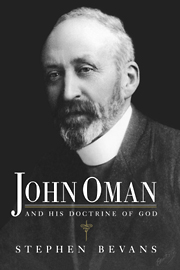6 - The God of Jesus Christ
Published online by Cambridge University Press: 05 September 2009
Summary
“Jesus … means more for our direct knowledge of God than all others.” The reader will detect a deeply Christian spirit in all of Oman's writings, but like his doctrine of God, Christology never receives a sustained, systematic, and definitive formulation. Indeed, we might even say that the doctrine of Jesus as the Christ is auxiliary to a doctrine of God. Oman's thought is not Christocentric.
Nevertheless it is not quite fair to say that his is “a very undeveloped Christology.” Oman's is not a traditional Christology, and purely Christological concerns were always quite subordinate to the understanding of God as personal. But Christology is essential to Oman's doctrine of God, and a treatment of his idea of God would be incomplete without a similar treatment of Jesus. This is why he insisted that Jesus Christ “remains for every religious soul not of relative but of absolute significance.”
A study of Oman's writings will reveal that his theology in general and his doctrine of God in particular take shape precisely because of this “absolute significance” of Jesus as Christ. While not Christocentric, Oman's theology can certainly be called Christo-morphic. Knowledge of Jesus Christ shapes (morphoō) and sharpens one's conception of God, and it is especially, if not exclusively, through Jesus that one comes to the idea of God as the patient, loving, challenging and yet forgiving parent who calls men and women to the freedom of God's sons and daughters.
- Type
- Chapter
- Information
- John Oman and his Doctrine of God , pp. 102 - 116Publisher: Cambridge University PressPrint publication year: 1992



